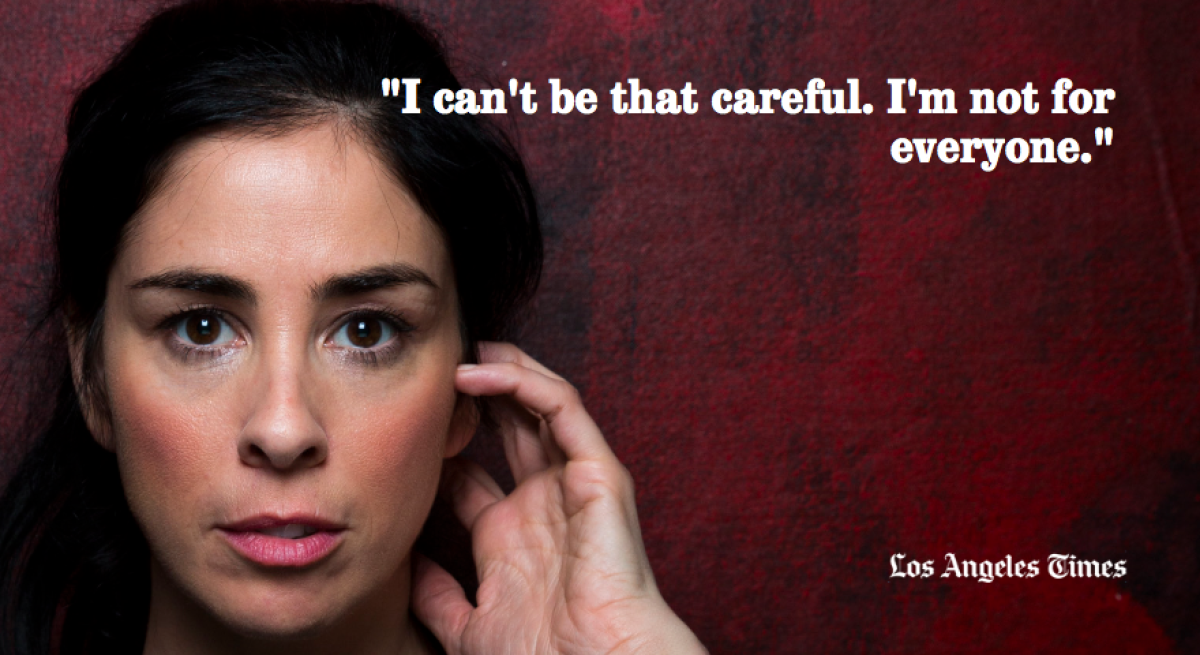Sarah Silverman taps into tumultuous childhood to deliver ‘I Smile Back’

“Stand-up comedy is about connection and looking in people’s eyes,” Sarah Silverman says.
Sarah Silverman is the mystery who sat behind you in high school, the quirky girl with the dagger wit and the pale, pretty face who could be a good friend but shame you quick if you misbehaved on a date.
Her humor is crass and penetrating, as if she were a provocative adolescent with an expansive, naughty vocabulary free-associating while clicking through TV channels. Of the current Republican presidential candidates: “It’s like the bar of crazy aliens in ‘Star Wars.’ ” Such observations glide on a voice of sly inflection, teasing out syllables and letting them ride toward jokes that land with revelation or revulsion.
“I can’t be that careful. I’m not for everyone,” she said the other day as dark clouds rolled toward a rooftop cabana in West Hollywood. “I go with my gut, and I go with what I think is funny, but my gut and what I think is funny changes with time. ... I’m not very good at selling myself. It kills me inside.”
See the most-read stories in Entertainment this hour >>
Silverman’s new film, “I Smile Back,” is something of a vanishing act for an actor whose identity has long been defined by her explicit stand-up comedy. Silverman plays Laney, a suburban mother whose well-tended exterior masks depression, drug addiction, adultery and a gradual, then very sudden, undoing. Laney seeks neither redemption nor absolution, only the addict’s recognition of the broken soul she has become.
Silverman suffered depression as a child growing up in New Hampshire. By the time she was 14, she was prescribed four Xanax four times a day.
“I was kind of numb, I guess,” she said. “It didn’t fix me in any way.”
Her first psychiatrist hanged himself; the hypnotist her parents hired to stop her bed-wetting told her of his death. Her years of depression and prescription meds were drawn on for “I Smile Back,” which demanded a deeper, more complex performance than previous roles.
“I don’t have easy access to my emotions,” she admitted. “They’re very tightly packed and compartmentalized. But for this part, they had to be on the surface. A really big director I admire told me once, ‘You’re really good, but I’ll never cast you in anything because you’re Sarah Silverman. People are too familiar with you. You’re like a personality. I need actors that people can get lost in.’ I couldn’t argue with him [she fake pouts] other than give me a chance.”

The daughter of the manager of a factory outlet, Silverman, 44, is one of the best comics of her generation, defying boundaries and drilling into racism, sexism, religion and other incendiary topics with a whining, petulant persona that is also strangely sweet. Expletives dart like ferrets through sentences, and her deadpan delivery of one-liners carries a charge: “I was raped by a doctor, which is so bittersweet for a Jewish girl,” she said in her 2005 concert movie, “Jesus Is Magic.”
Adam Salky, director of “I Smile Back,” was convinced Silverman was right for Laney after revisiting her small, memorable performances as an overbearing girlfriend in “School of Rock” and an alcoholic sister in “Take This Waltz.” It helped that Silverman’s autobiography, “The Bedwetter: Stories of Courage, Redemption and Pee,” which explored her early depression, gave her the instincts for a woman in turmoil.
“Sarah has a pool of emotional and intellectual depth,” Salky said. “You put the camera on her and let it run.”
That inclination came to mind the other day at the hotel cabana where Silverman, jeans tucked into boots and wearing a brown blazer, bent over a chair to turn down house music blaring from a speaker. The manager intervened; the music died, and Silverman, a woman you could play stickball with or take to the Ritz, settled onto a cushion whose stains she pondered with a degree of perversion.

“Jack Nicholson said something great,” she said, channeling Nicholson’s voice and mannerisms. “He’s like, ‘If I ever take on a scene and the director has a different take, I always go with the director and then I don’t become predictable.’ He is someone who will always have his face and his voice and be specifically him. But he does disappear into roles. He’s an astronaut, a mobster. That inspired me.”
Her humor is calibrated to the times, especially these days with the presidential campaign going full throttle and candidates trundling across the nation like a beguiling smorgasbord. She said Hillary Rodham Clinton is “strong and bold on women’s issues,” including equal pay, an enduring topic in Hollywood most recently raised by Jennifer Lawrence. “Women deserve equal pay to men. It seems so trite to say it,” Silverman said. “It’s bizarre.”
But she’s passionate about Bernie Sanders, who, like her, is another New England Jew who speaks his mind even if it’s always not popular.
“Bernie is the only politician not for sale,” she said. “Look, I love Hillary too, but Goldman-Sachs owns her. She might as well be wearing race car driver [logos]. ... Everybody’s for sale, and here’s this guy who’s been a senator for a million years from Vermont who is just simply not for sale.” She lowered her voice and smiled, “When I met him I said, ‘Keep the Jewish thing down for as long as you can.’”
She wrings both glee and contempt from Republican candidates: “Trump’s out of his mind, but he’s been great in terms of exposing the realities of politics,” she said. “Greed, money, addiction.”
Silverman has more than 7 million Twitter followers and recently referred to herself as “the Sylvia Plath of social media.” She finds both rage and insight in the messages that scrawl across her screen. She responds only occasionally — and with disarming politeness — to attacks on her political or social views online.
“People are so brave and angry from their mother’s basement,” she said. “Their avatars are always like animations of themselves with muscles and guns. ... But it’s amazing that if you give these people love, they’re far more open. It taught me a lot about making points and trying to change minds.”
But she doesn’t believe that social media or its gadgets, such as iPhones, need to be so pervasive, notably during her stand-ups at colleges, where she often looks out at to the glow of cellphones.
“Stand-up comedy is about connection and looking in people’s eyes. This sea of empty vessels in which Facebook expresses itself,” she said, “it’s uninspiring. ... And when they make an announcement and you still see it, then it hurts. That’s how badly you want a fuzzy, [expletive] video of me for your stupid Facebook page.”
One sensed the cursing was not quite over. She took a breath. The clouds rolling toward the rooftop cabana stayed at bay. A breeze lifted her black hair and slipped away. Dusk was not far off, and in a few days “I Smile Back” would open and Silverman, a blend of grace and chutzpah, would let others see the actor she wanted to be years ago when in the quiet of a New Hampshire bedroom she read lines and pretended.
“If you stick with what works, you become a caricature of yourself,” she said. “How can you surprise someone if you keep giving them what they want?”
Twitter: @JeffreyLAT
ALSO:
‘Bridge of Spies’: Can it head to ‘Lincoln’ levels?
Back to the Future Day: What the franchise sneakily got right
AFI Fest adds ‘The 33’ and ‘Where to Invade Next’ to its slate
More to Read
Only good movies
Get the Indie Focus newsletter, Mark Olsen's weekly guide to the world of cinema.
You may occasionally receive promotional content from the Los Angeles Times.











